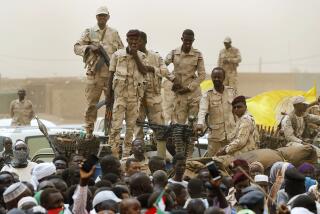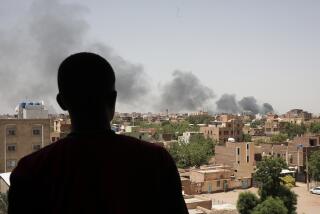Albright Vows to Discourage Ties With Sudan
NAIROBI, Kenya — Secretary of State Madeleine Albright, after a meeting here Saturday with Sudanese rebel leader John Garang, said she will renew U.S. discouragement of investment in Sudan’s fledgling oil industry.
Canadian, Malaysian and Chinese firms are cooperating in the operation of a pipeline exporting oil from newly developed fields in Sudan, where a brutal civil war has been raging for 16 years. The U.S. government has prohibited American firms from investing.
“We are going to have to talk to our allies about ways to put pressure on” Sudan, Albright told reporters at the end of a six-day trip across Africa. “There are countries that believe if a government that is dictatorial has more money, that some of it will filter to the people. It doesn’t happen that way.”
A senior U.S. official said several Western nations have economic ties with the northeast African country, the largest on the continent.
The Clinton administration considers the Sudanese government to be a brutal dictatorship and by far the worst offender in an atrocity-filled regional, religious and ethnic war that has claimed as many as 2 million lives.
Washington has imposed comprehensive sanctions against the government while offering moral support to the rebels led by Garang. The United States has no diplomatic relations with Sudan.
The government is controlled by Muslim Arabs from the northern part of the country. The rebels, mostly from the south, are black Africans who practice Christianity and native religions.
The war in Sudan has become a major cause to some Christian groups in the United States, which contend that the Muslim rulers are engaged in systematic religious persecution. But Albright said the issues are far more complex.
She conceded that the United States has very little leverage to use against the Sudanese government because there are neither diplomatic nor economic relations between the countries.
In addition to Garang, Albright conferred Saturday with Sudanese exiles and with officials of the Inter-Governmental Authority on Development, an African organization assigned the daunting task of trying to mediate a peace accord in Sudan.
Albright said Washington supports the inter-African process--known by the initials IGAD--as a promising approach. But she warned IGAD’s chief, Kenyan diplomat Daniel Mboya, that “there is not a lot of time” for the often ponderous organization to produce results.
Garang supports the IGAD process, but the Sudanese government has been cool to the organization’s efforts. IGAD’s peace plan calls for regional autonomy and freedom of religion within Sudan, both aims of the rebels.
Albright was lavish in her assessment of Garang, chairman of the Sudan People’s Liberation Army, who holds advanced degrees from two U.S. universities.
“He is sophisticated and dedicated and determined,” she said. “He is a very dynamic leader who has a goal [independence for the south] that is difficult to fulfill because he is a leader without international recognition.”
More to Read
Sign up for Essential California
The most important California stories and recommendations in your inbox every morning.
You may occasionally receive promotional content from the Los Angeles Times.










